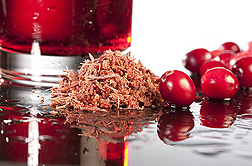| Read the magazine story to find out more. |
|
|
|
|
Cranberry Compound May Help Prevent Urinary Tract Infections
By Rosalie Marion Bliss
March 8, 2016
A new cranberry bioactive component that has the potential to control urinary tract infections (UTIs) has been identified by U.S. Department of Agriculture (USDA) scientists and collaborators. The bioactive component, referred to as SSGG fraction, is found in cranberry juice and is purified from enzyme-treated cranberry pulp. SSGG was found to inhibit Escherichia coli—the most common bacterial cause of UTIs—from sticking to human cells in laboratory tests.
The work was led by Agricultural Research Service (ARS) plant physiologist Arland Hotchkiss with colleagues at the Eastern Regional Research Center in Wyndmoor, Pennsylvania, in collaboration with university and private-sector researchers. The work was supported by an agreement with Ocean Spray Cranberries, Inc. based in Lakeview, Massachusetts.
UTIs are the second most common type of infection in humans, leading to more than 8 million doctors’ visits annually. UTIs are treated with antibiotics, but natural substances that help prevent UTIs could be useful because antibiotics can lead to bacterial resistance.
In cranberries, the researchers studied the structure of plant compounds called “xyloglucan oligosaccharides” and identified the SSGG type that has the potential to help control UTIs. A study reporting the findings was published in the May 2015 issue of Journal of Agricultural and Food Chemistry.
ARS and Ocean Spray representatives have a recently approved patent describing how to produce cranberry xyloglucan oligosaccharides that have antiadhesive activity.
In laboratory experiments using test tubes and cell cultures, the researchers tested cranberry xyloglucan SSGG oligosaccharide’s ability to interfere with the attachment of specific bacterial strains to urinary tract cells. They found that xyloglucan oligosaccharides inhibited the adhesion of E. coli strains to human bladder epithelial cells and human colonic epithelial cells. Studies into possible benefits of cranberry compounds for mitigating UTIs have thus far been conducted using laboratory vessels. The efficacy of cranberry xyloglucan SSGG oligosaccharides can now be tested in human clinical trials.
ARS is USDA’s principal intramural scientific research agency.
Read more about this work in the March 2016 issue of AgResearch.

